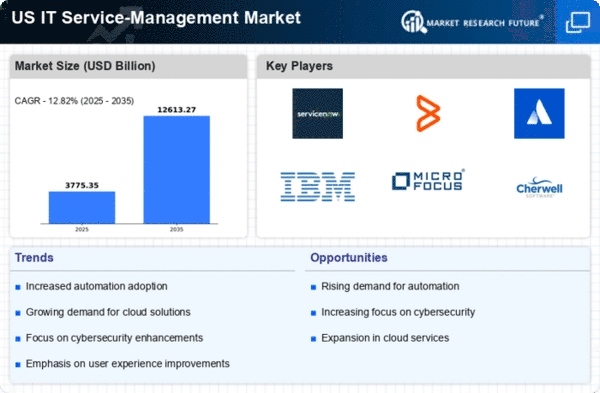Adoption of Agile Methodologies
The it service-management market is being driven by the widespread adoption of agile methodologies across various sectors. Organizations are increasingly recognizing the benefits of agile practices in enhancing flexibility and responsiveness to changing business needs. This shift towards agility necessitates the implementation of service management solutions that support iterative processes and continuous improvement. Recent surveys indicate that over 60% of IT departments are transitioning to agile frameworks, which is likely to create a robust demand for tailored service management tools. As businesses embrace agility, the IT Service-Management Market is poised for significant growth.
Growing Demand for IT Efficiency
The it service-management market is experiencing a notable surge in demand for enhanced operational efficiency. Organizations are increasingly recognizing the necessity of streamlining IT processes to reduce costs and improve service delivery. According to recent data, companies that implement effective IT service management strategies can achieve up to 30% reductions in operational costs. This trend is driven by the need for businesses to remain competitive in a rapidly evolving technological landscape. As organizations strive to optimize their IT resources, the IT Service-Management Market is likely to see a corresponding increase in the adoption of innovative solutions that facilitate efficiency and productivity.
Rising Complexity of IT Environments
The it service-management market is significantly influenced by the growing complexity of IT environments. As organizations adopt diverse technologies, including cloud services, mobile applications, and IoT devices, managing these multifaceted systems becomes increasingly challenging. This complexity necessitates robust service management solutions to ensure seamless integration and operation. Recent studies indicate that over 70% of IT leaders cite managing hybrid environments as a top priority. Consequently, the demand for sophisticated service management tools that can address these complexities is expected to rise, driving growth in the IT Service-Management Market.
Increased Focus on Customer Experience
In the current landscape, the IT Service-Management Market is witnessing a heightened emphasis on customer experience. Organizations are increasingly aware that superior IT services directly correlate with customer satisfaction and retention. As a result, many are investing in service management solutions that enhance user experience and streamline support processes. Data suggests that companies prioritizing customer experience can see improvements in customer loyalty by as much as 25%. This focus on delivering exceptional service is likely to propel the growth of the it service-management market as businesses seek to differentiate themselves through superior service offerings.
Regulatory Compliance and Risk Management
the IT Service-Management Market is also shaped by the increasing need for regulatory compliance and risk management. With the rise of data protection regulations, such as GDPR and CCPA, organizations are compelled to adopt comprehensive service management frameworks that ensure compliance. This trend is particularly pronounced in industries such as finance and healthcare, where non-compliance can result in substantial penalties. As organizations navigate these regulatory landscapes, the demand for IT service management solutions that facilitate compliance and mitigate risks is expected to grow, thereby influencing the market positively.
















